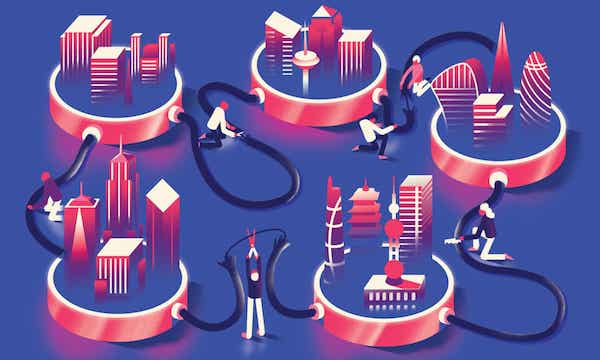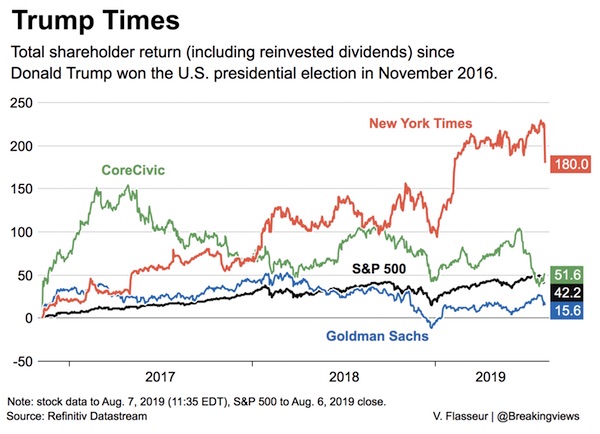
Piet Mondriaan New York City I 1942

“And That’s A Good Thing..”
• Globalization As We Know It Will Not Survive Trump (G.)
The significance of the trade war between China and the US goes well beyond the impact of tit-for-tat tariffs, or which of two self-styled strongmen wins the bragging rights. As was the case in the 1930s, the seemingly inexorable drift towards protectionism is part of a deeper crisis of the international status quo. When Beijing this week accused the US of “deliberately destroying the international order”, it was really saying that US hegemony will no longer go unchallenged. Globalisation as we have known it is coming to an end and that’s by no means unwelcome.
Hailed as the ultimate in human progress, a model based on loosening the controls on capital and the construction of global supply chains has spawned recurrent financial crises, fostered corrosive inequality and worsened the climate emergency. True, millions of people have been lifted out of poverty in the past 25 years, but most of them live in a country – China – that has kept the market at arm’s-length. The world’s stock markets see things differently. They tremble every time Donald Trump tweets a paean to protectionism. Likewise, multinational corporations fret about the possible damage that trade barriers might cause to global supply chains. It is clear that those who have done best out of globalisation tend to be the rich and powerful, and they are not going to give up their privileges without a fight. Nothing in this is new.
Throughout history there have been successive waves of globalisation followed by a backlash when the model over-reached itself. This is one of those occasions and all the ingredients are in place for a struggle between the defenders of the status quo and those who say that recent trends in politics, technology and the climate point to the need for a new world order focused more on local solutions, stronger nation states and a reformed international system. It’s quite a stretch to imagine that Trump has this in mind when he is bashing China, but the economic crisis of the 1930s – of which protectionism was one part – led eventually, albeit after the war, to reforms that made the world a sounder and safer place.

Illustration: Thomas Pullin

“..once your savings are depleted and your debts are maxed out, you are cast out into the howling wilderness roamed by various troglodytes—those the information revolution has already eaten as well as those who were never on the menu.”
• The Technological Revolution Devours its Children (Dmitry Orlov)
As the famous movie quote goes, “If you can’t spot the sucker in your first half hour at the table, then you are the sucker” (From John Dahl’s 1988 film Rounders). Another famous quote, all the way back from the French Revolution, is “The revolution, like Saturn, devours its own children” (said by Danton at his trial). If you can’t spot the resource for your next technological revolution, then you are the resource. Look at all the previous technological revolutions. In each case, a new technology opened up for exploitation a new, superabundant resource: agriculture—arable land; mechanical spinning and weaving—water power; steam engine and steelmaking—coal; internal combustion engine—oil; artificial intelligence-based robonanobiotronics—still oil?
Sorry, that’s no longer overabundant by any stretch of the imagination. (If you said “renewable energy” then think again: wind turbines, solar panels and battery banks can’t be made or maintained without oil and natural gas.) Technology without a superabundant resource it can tap into is as useful as a spoon if your bowl is empty. The logic is simple: spot the resource; if you can’t, it’s probably you. Let’s focus on what’s supposed to be the main pillar of the next technological revolution: information technology. Most of us have smartphones, laptops, store our data in the cloud and make use of abundant and free information resources—all the free apps you want, free blogging, free Youtube videos, etc. But what new resource has all this technology opened up for you, the user?
The hardware costs you money (the average iPhone now costs around 800 USD) and the time you spend fiddling around with it is subtracted from all the other, potentially useful and gainful activities. You could try arguing that having an iPhone makes you more efficient because you have all the information and communications technology you could possibly need right at your fingertips. That point is hard to deny. I recently recorded a radio interview for a radio station in upstate New York while strolling about among the potato blossoms on my field in the Novgorod region of Russia via the internet and a 4G connection via a tower in the neighboring village. That’s nothing short of miraculous, and it’s certainly efficient (my smartphone is 7 years old, fully amortized a long time ago and still as good as new now that I’ve replaced every single mechanical component, sometimes twice). But is it effective?
The smartphones are generally effective in making their users spend money that they may or may not have on things they may or may not need. All of the free access to information is paid for by collecting data on users (spying, basically) and using it to create targeted ads that turn users into online shoppers. Everything is highly customized: women look at pictures of shoes; men look at pictures of power tools. Both the shoes and the power tools, if purchased, will be used a few times a year at most, but the money will be gone forever. The limiting factor here, of course, is the resource, which is you: once your savings are depleted and your debts are maxed out, you are cast out into the howling wilderness roamed by various troglodytes—those the information revolution has already eaten as well as those who were never on the menu.

Depends on who you ask.
• Donald Trump More Popular Today Than In 2016 (Raw)
President Donald Trump’s administration has been mired in controversy after controversy, from his racist remarks to the Mueller report–which stopped short of clearing him of obstruction of justice. His policies, such as child separation at the border and his trade wars with China, are divisive. Yet, new numbers seem to show that he’s actually more popular today than he was in 2016, according to polling expert Nate Cohn. “The share of Americans who say they have a favorable view of him has increased significantly since the 2016 election,” Cohn writes. “And over the last few months, some of the highest-quality public opinion polls, though not all, showed the president’s job approval rating — a different measure from personal favorability — had inched up to essentially match the highest level of his term.”
This doesn’t guarantee Trump re-election. “The increase in his support since 2016, and the possibility that it continues to move higher, does not necessarily make him a favorite to win re-election. His job approval ratings remain well beneath 50 percent, and have never eclipsed it.” It should be noted that Cohn is relying on two polls, Gallup and YouGov, which show that he is more popular today than in 2016. And according to the website fivethirtyeight.com, which aggregates polling data, only 42.2 percent of Americans polled approve of Donald Trump, while 53.1 disapprove.
But, Trump’s surge in popularity since 2016 is clearly something his democratic challengers need to keep in mind. Of course, Democrats might benefit from a more popular candidate than they had in 2016,” Cohn writes. “Hillary Clinton was an unusually unpopular candidate, surpassed only by Mr. Trump in this regard in the modern era of polling. But an analysis that freezes the president’s standing in 2016 but assumes an improvement for the Democratic nominee would be misleading.”

Cui bono. Inventing Russiagate out of thin air has paid off handsomely.
• New York Times Stock Price Has Soared During Trump’s Presidency (R.)
Lieutenant Colonel Bill Kilgore concludes his “Apocalypse Now” soliloquy about the smell of napalm in the morning wistfully: “Someday this war’s gonna end.” The remark suggests the officer played by Robert Duvall is enjoying the conflict in Vietnam. Despite some recent friendly fire, New York Times commander-in-chief Mark Thompson could be forgiven for feeling similarly about his newspaper’s combat with U.S. President Donald Trump. Few companies have so directly benefitted from Trump’s tumultuous first term in office as the Times. Thanks to a boom in digital-subscription sales linked to the paper’s aggressive coverage of the administration’s many foibles, its shares have outperformed those of nearly every company investors pegged as those likely to suffer or benefit from a Trump presidency.
From around $11 at the time of his election, Times stock has soared to more than $35. That trumped the runup in Wall Street firms, such as Goldman Sachs and Morgan Stanley, whose bottom lines were fattened by tax cuts. Times shares even dusted those of Facebook, the bête noire of all traditional publishers. As of Tuesday, the Manhattan-based company’s $5 billion market value was greater than the combined worth of America’s two biggest for-profit prison operators, whose fortunes were meant to soar under a law-and-order presidency. This background helps in interpreting a set of lousy second-quarter results, and a kerfuffle this week over a poorly conceived front-page headline. The Times added 197,000 net new digital-only subscriptions – bringing total subscribers to 4.7 million, nearly halfway to its 2025 goal of 10 million.
A shortfall in revenue, though, and a warning of greater challenges ahead, took nearly 20% off the Times share price on Wednesday. That came days after amending a headline related to the president’s response to two mass shootings over the weekend failed to stop a barrage of criticism, much of it from Trump’s Democratic opponents, and calls on social media to cancel subscriptions. The top-line miss had nothing to do with the headline skirmish, whose impact would appear in this quarter. But they are not unrelated. The risk for the Times is that any whiff of normalizing its coverage of the president might damage the brand that has fueled its subscription drive since 2016. One dopey headline is survivable, so long as the war shows no sign of ending.


MMT is not going to go away.
• MMT May Be Democrats’ Economic Cure, But Only Trump Got The Memo (R.)
From her home overlooking Setauket Harbor on Long Island’s North Shore, a motorboat bobbing at the dock, Stephanie Kelton hopes to revolutionize how the U.S. government manages the economy. It isn’t always a pleasant task. A key figure in the “Modern Monetary Theory” economic camp, her assertions that the federal government could spend freely for things like a jobs guarantee or Green New Deal without risking runaway inflation, a debt default or a clubbing by global creditors have been Twitter-bombed by mainstream economists as left-wing free lunchism. Proponents of MMT have been called fanciful for the notion that the U.S. Congress, which typically struggles to pass an annual budget, could with smart budgeting and regulation take over the Federal Reserve’s job of controlling inflation.
And even Kelton, an economics professor at Stony Brook University in New York and an adviser to Senator Bernie Sanders’ presidential campaign, is a bit thrown by the fact that the person who appears closest to accepting her argument is President Donald Trump, whose Republican Party has traditionally touted an adherence to fiscal discipline. Trump and Republicans in Congress, she said, “did not allow perceived budget constraints to stand in their way” of a $1.5 trillion tax cut package which was passed in late 2017 and pushed the federal debt beyond $22 trillion. Democrats now seem ready to get in the game. Lawmakers from both parties recently reached a federal spending deal that is expected to raise the federal deficit by $2 trillion over the next two years, and Democrats lining up to run against Trump in 2020 have largely avoided talk of fiscal restraint so far in the campaign.

Told ya: “One Conservative insider said that Cummings had in effect demanded control over Johnson’s operation as his price for entering government..”
• New Rebel Bid To Halt No-Deal Brexit Amid Fury At PM’s Enforcer (G.)
Rebel MPs are working on a plan to thwart Boris Johnson pursuing a no-deal Brexit on 31 October that involves forcing parliament to sit through the autumn recess, amid growing outrage about the power and influence of his controversial aide, Dominic Cummings. The cross-party group of MPs is looking at legislative options with mounting urgency because of the hardline tactics of Cummings, who one Conservative insider described as running a “reign of terror” in No 10 aimed at achieving Brexit on 31 October at any cost. Three MPs have told the Guardian that one method under discussion is for members to amend the motion needed for parliament to break for party conferences in mid-September.
This could give MPs another three weeks of sitting time to stop a no-deal and potentially open the door for days to be set aside for rebels to control parliamentary business. The ultimate aim would be to pass a bill forcing the government to request an extension to article 50 from Brussels. Since joining Johnson’s administration, Cummings has told government advisers that No 10 stands ready to do whatever is necessary to bring about Brexit on 31 October – deal or no deal. This could include proroguing parliament, or ignoring the result of any no-confidence vote in Johnson and calling a “people v politicians” general election – to be held after the UK had left the EU.
However, it is understood that alarm is mounting within No 10, among some special advisers and Tory MPs about the scale of Cummings’ influence and willingness to defy parliament. One Conservative insider said that Cummings had in effect demanded control over Johnson’s operation as his price for entering government and proceeded to sideline more moderate advisers, such as ex-City Hall stalwart Sir Eddie Lister, while installing a team of “true believers” in hard Brexit largely from the former Vote Leave campaign.

Are you sure?
• Deal Or No Deal? It’s Not Really Up To Dominic Cummings (G.)
Yet it would be as much of a mistake to dismiss Cummings as to exaggerate his mastery. He has certainly brought two weeks of focus to the Johnson government by making the Halloween deadline a non-negotiable centrepiece. He has changed the political conversation from Brexit or people’s vote to deal or no deal. Depending on events in the early autumn, he is clearly gearing up for a possible general election shortly afterwards. But Cummings does not control events. He is not Prospero, able to conjure up a tempest that delivers his enemies into his hands. He is having a good run, but he is helped by the most irresponsible parliamentary summer recess of modern times.
Even now MPs should be aiming to get back to Westminster and hold the government to account before the planned return on 3 September. They should scrap this year’s party conferences too. Cummings is also only one player. The idea that he pulls all the strings is lazy and wrong. The Brexit outcome depends on a tangled web of interests and influences beyond his control. These include everything from the role of the Queen to the hoarding of toilet rolls. In particular, it depends on events in the real economy, in parliament, in the courts, in Northern Ireland, Scotland and the Irish Republic, in the EU and in Johnson’s own head.
Those who take a Cummings-fixated view of the options find it is easier to forget this. They say the government’s aim is to crash out with no deal on 31 October and nothing will stand in the way. But that is not quite what Johnson and some of his ministers say. They say, still, that a deal is one possibility, perhaps a remote one, and that the UK government is even now looking for a deal with the EU in the next 12 weeks.

“..people whose incomes sit a few zeroes above their value to society.”
• The Super-Rich Have Made Britain Into A Nation Of Losers (G.)
Think of a football stadium. Not one of the vast caverns like Old Trafford or Wembley, but somewhere rather smaller and more bijou. Somewhere like Fulham’s Craven Cottage, which, once its new stand is completed, will pack in only about 30,000 fans. Now imagine this stadium of 30,000 souls rising up into the air and hovering unnoticed over central London. Thirty thousand men in late middle-age living the high life with the capital at their feet – and there, stuck way below on terra firma are their 66 million fellow Britons, tearing lumps out of each other. Congratulations: you’ve just pictured the central problem stalking the UK today. Not Brexit. Not the breakdown in civil debate. Not the dark money contaminating Westminster.
These are urgent and vitally important, but there is one big factor that forms a large part of the backdrop to all of them. It can be summed up by that gulf between a mid-sized football stadium of super-rich men in their 50s, and the rest of us spread out across our suburbs, our towns, our unpretty stretches of urban sprawl. That football stadium represents the top 0.1% of earners in the UK. To join their ranks, numbering just 31,000, you’d need a taxable income of at least £650,000 a year – £12,500 per week. In less than a fortnight, you would easily pull in more than the average Briton makes as taxable income over a whole year. But then, those drudges are the earthbound while you, as the old song out of Mary Poppins puts it, live in an entirely different realm: “Up to the highest height! … Up through the atmosphere! / Up where the air is clear!”
The stratospherically rich are among the subjects of a new report by the Institute for Fiscal Studies. An analysis of the tax returns of the highest earning Britons, it shows in uncompromising detail just how our money has ended up in fewer and fewer hands based in less and less of the country. Almost half the super-rich live in London and nearly 90% of them are men. What’s more, they often end up paying a lower tax rate than the pay-as-you-earn mugs like you and me. The generous breaks given by politicians to encourage entrepreneurship, innovation and risk-taking are instead exploited by partners in City law firms and big accountancies and at hedge funds – people whose incomes sit a few zeroes above their value to society.

It’s not just the 737 MAX. It’s Boeing itself.
• Airlines Complain Boeing’s Production Standards ‘Way Below Acceptable’ (BI)
Airlines flying Boeing’s 787-10 Dreamliner have complained to the plane maker about “unacceptable” production mistakes and inconsistent quality. The problems center around Dreamliners built at Boeing’s North Charleston, South Carolina, factory, according to a report from The Post and Courier. Issues at the North Charleston plant were reported in April in a comprehensive New York Times investigation, which found evidence of shoddy production, poor oversight, and a culture that “made speed a priority over safety.” The report came a month after Boeing’s 737 Max jet was grounded worldwide after the second fatal crash in five months. The Department of Justice expanded an inquiry into the 737 Max to include issues at the North Charleston factory in June.
The new report surfaced complaints from a global cadre of airlines that fly the jet and have received orders from the South Carolina plant, one of two locations where the Dreamliner is assembled — other orders are built at Boeing’s Everett, Washington, factory. While the issues are not limited to either the South Carolina plant or the 787 — similar problems have been raised in Everett with both 787s and military tankers — the complaints surfaced by The Post and Courier focus on recent deliveries of Boeing’s newest and largest variant of the Dreamliner, the 787-10. It was not immediately clear whether the airlines made similar complaints about other variants of the plane, including the 787-8 and 787-9.

Paul Craig Roberts on an FBI document that talks about “official” and “prevailing” explanations of events.
“What the FBI report does, intentionally or unintentionally, is to define a conspiracist as a person who doubts official explanations.”
• An Open Invitation to Tyranny (PCR)
The FBI document says that conspiracy theories “are usually at odds with official or prevailing explanations of events.” Note the use of “official” and “prevailing.” Official explanations are explanations provided by governments. Prevailing explanations are the explanations that the media repeats. Examples of official and prevailing explanations are: Saddam Hussein’s weapons of mass destruction, Assad’s use of chemical weapons, Iranian nukes, Russian invasion of Ukraine, and the official explanation by the US government for the destruction of Libya. If a person doubts official explanations such as these, that person is a “conspiracy theorist.”
Official and prevailing explanations do not have to be consistent with facts. It is enough that they are official and prevailing. Whether or not they are true is irrelevant. Therefore, a person who stands up for the truth can be labeled a conspiracy theorist, monitored, and perhaps pre-emptively arrested. [..] Consider Russiagate. Here we have an alleged conspiracy between Trump and Russia that was the official prevailing explanation. Yet, to believe in the Russiagate conspiracy did not make one a conspiracy theorist as this conspiracy was the official prevailing explanation. But to doubt the Russiagate conspiracy did make one a conspiracy theorist.
What the FBI report does, intentionally or unintentionally, is to define a conspiracist as a person who doubts official explanations. In other words, it is a way of preventing any accountability of government. Whatever the government says, no matter how obvious a lie, will have to be accepted as fact or we will be put on a list to be monitored for preemptive arrest. In effect, the FBI’s document reduces the First Amendment, that is, free speech, to the right to repeat official and prevailing explanations. Any other speech is a conspiratorial belief that can lead to the commission of a crime.

The judge says she can pay the fines, but he’s the only one who thinks that.
• Chelsea Manning Jailed For a YEAR For Refusing To Testify Against Assange (RT)
Refusal to testify against WikiLeaks is costing whistleblower Chelsea Manning over $400,000 in fines and another year in jail, after a federal judge ruled that she must pay for what he called contempt of court. Manning was jailed for refusing the subpoena to testify before a federal grand jury seeking additional charges against WikiLeaks and its co-founder Julian Assange, currently imprisoned in the UK. To compel testimony, the government also fined the whistleblower $500 a day, going up to $1000 after 60 days. Judge Anthony Trenga of the federal district court in Alexandria, Virginia shot down Manning’s motion to reconsider sanctions on Monday, the final chance to contest the steep fines.
After a review of “a substantial number of financial records documenting her assets, liabilities, and current and future earnings,” the court found “that Ms. Manning has the ability to comply with the Court’s financial sanctions,” Trenga wrote in his ruling. Though Manning is now deeply in debt and unable to work while in jail, the judge nonetheless concluded the fines were payable and therefore amounted to “coercive” sanctions allowed to compel cooperation or testimony, rather than being a purely punitive measure. “I am disappointed but not at all surprised. The government and the judge must know by now that this doesn’t change my position one bit,” Manning said in response.
She insisted that the fines were in fact punitive, because her inability and unwillingness to pay rendered any “coercive” aspect moot. She has already spent 147 days behind bars and owes $38,000 in fines as of August 7. If she remains jailed for another year, Manning could end up owing $441,000 to the government.

Not everything scales up.
• Tightening Nickel Supply Threatens Electric Vehicle Boom (SH)
For Tesla and its chief competitors in the race for global domination of electric vehicle sales, it ain’t all about lithium ion. There are other valuable metals needed to make the battery packs do what’s asked of them, with nickel being essential. Tesla and its battery producer partners, and other automakers and their suppliers, are worried about the longer-term supply of nickel according to a new study by BloombergNEF. The study predicts that EV makers will be driving demand for nickel about 16 times to 1.8 million tons in the next years. Class-one nickel, a high-purity material used in batteries, is expected to see demand greatly outstrip supply in the next few years. That will be fueled by meeting the large Chinese EV market, and other global markets where demand is expected to grow.
That need for class-one nickel will outstrip supply within five years, according to the study. One problem has been a lack of real investment in new mines for materials including nickel, Tesla’s global supply manager of battery metals, Sarah Maryssael, said at a Washington meeting in May. That could drive up prices as battery demand increases greatly. Tesla CEO Elon Musk is concerned about having enough economically viable — and available — metal to continue meeting its growing electric car demand. That will take off even more as the company taps into China’s booming markets. “They are getting ready to have the new factory in China, and are at full capacity in North America,’’ Peter Bradford, chief executive officer of nickel producer Independence Group NL, said. “They recognize the biggest risk from a strategic supply point of view is nickel.’’

Kind of mad that this didn’t stop America from sending its young people to be killed and maimed in more jungles and deserts.
• Apocalypse Now: Final Cut (G.)
‘Someday this war’s gonna end,” is the sage comment from surf-crazed Wagner enthusiast Lieutenant Colonel Kilgore, brusquely played by Robert Duvall. In fact, when Francis Ford Coppola’s grandiose epic masterpiece Apocalypse Now was first unveiled in 1979, the Vietnam war had only ended four years previously, and the succeeding Cambodian-Vietnamese war (where the film’s climax is set) was in full swing. Coppola’s bad trip into south-east Asia was co-written by John Milius with narration written by Michael Herr. It was inspired by Joseph Conrad’s novel Heart of Darkness, Herr’s own Vietnam reportage-memoir Dispatches and maybe at one further remove by Rudyard Kipling’s lines about the US taking up the white man’s imperial burden.
It was famously an ordeal for all concerned. The production involved a filming expedition in the Philippines that felt hardly less colossal and traumatic to the participants than the actual war, though it became commonplace in Hollywood’s Vietnam for the anguish of American soldiers, not that of the Vietnamese people themselves, to be seen as important. (The nearest that Vietnamese people get to actual importance in Apocalypse Now is the four South Vietnamese intelligence officers, executed by ColKurtz as Communist spies, whose ID cards we briefly see.) Like Lawrence of Arabia, moreover, this is a film without women – or mostly.

Marlon Brando in Apocalypse Now. Photograph: Allstar/United Artists

“The study found that American agriculture has become 48 times more toxic to insects over the past 25 years and pinned 92 percent of the toxicity increase on neonicotinoids..”
• Explosion of Toxic Pesticide Use Causes Insect Apocalypse in US (CD)
The rapid and dangerous decline of the insect population in the United States—often called an “insect apocalypse” by scientists—has largely been driven by an increase in the toxicity of U.S. agriculture caused by the use of neonicotinoid pesticides, according to a study published Tuesday in the journal PLOS One. The study found that American agriculture has become 48 times more toxic to insects over the past 25 years and pinned 92 percent of the toxicity increase on neonicotinoids, which were banned by the European Union last year due to the threat they pose to bees and other pollinators. Kendra Klein, Ph.D., study co-author and senior staff scientist at Friends of the Earth, said the United States must follow Europe’s lead and ban the toxic pesticides before it is too late.
“It is alarming that U.S. agriculture has become so much more toxic to insect life in the past two decades,” Klein said in a statement. “We need to phase out neonicotinoid pesticides to protect bees and other insects that are critical to biodiversity and the farms that feed us.” “Congress must pass the Saving America’s Pollinators Act to ban neonicotinoids,” Klein added. “In addition, we need to rapidly shift our food system away from dependence on harmful pesticides and toward organic farming methods that work with nature rather than against it.” According to National Geographic, neonics “are used on over 140 different agricultural crops in more than 120 countries. They attack the central nervous system of insects, causing overstimulation of their nerve cells, paralysis, and death.” With insect populations declining due to neonic use, “the numbers of insect-eating birds have plummeted in recent decades,” National Geographic reported. “There’s also been a widespread decline in nearly all bird species.”

Amazon: ~2,700,000 sq mi (7,000,000 km2)
Contiguous US: ~3,100,000 sq mi (8,000,000 km2)











Home › Forums › Debt Rattle August 8 2019